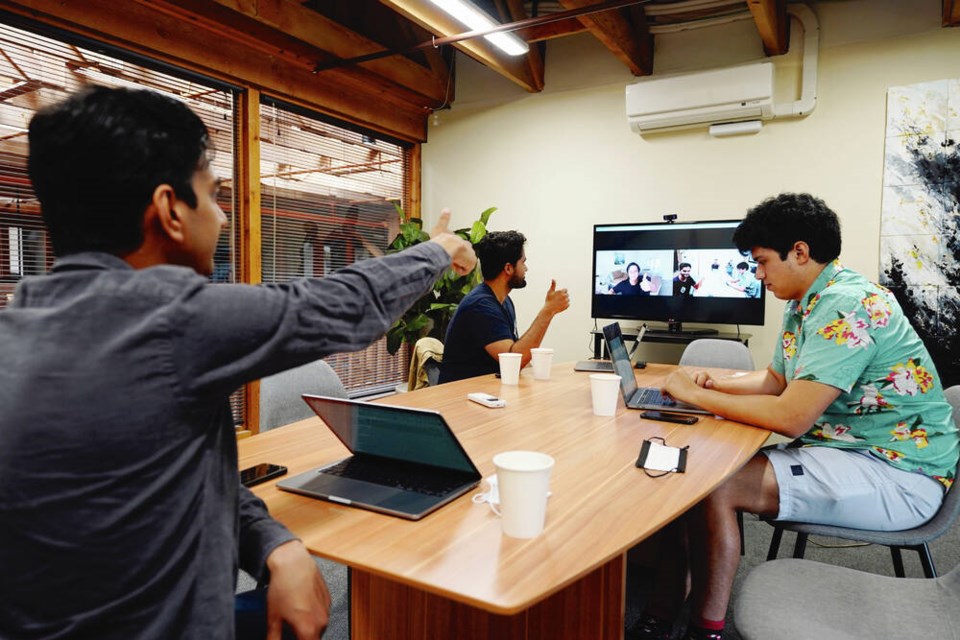I am a little disappointed with the future. Here we are, a quarter of the way into the 21st century, and nobody flies around in jetpacks or works on the planet Mars.
Not that many people even work from home anymore.
According to Statistics Canada, after rising to a high of 40% in April 2020, the percentage of Canadians working from home in a given week steadily fell to 20% by November 2023.
This un-futuristic trend surprises me, because working from home is so easy! You only need three things: First, you need access to a reliable internet connection.
Second, you need what strategic human resources professionals refer to as “employment.” This could be pretty much anything, but is most successful with office jobs that involve a person sitting in front of a computer pretending to type, but actually watching YouTube videos.
According to Statistics Canada, 39% of Canadian jobs could, in principle, be done from home. This means you really need to think hard about careers like astronaut, cardiovascular surgeon or mixed martial arts fighter, which can’t be done at home with any accuracy. On the plus side, they do wear pajamas all day, just like at-home workers.
Finally, you need somewhere — a library, café, beach in the south of France — from which to work that is not the usual. I can’t stress this enough: If you’re in the regular workplace wearing typical work clothes, you’re doing it wrong.
Working at home by yourself means way fewer interruptions and distractions, such as playing Call of Duty: Modern Warfare on the Xbox after the kids leave for school. Sorry, I meant not doing that at home. NOT at home, not ever.
Another major advantage of working from home is that you save a lot of money on professional office attire, such as pants. You also save on personal-grooming costs like haircuts, and beauty treatments like eyelash tinting and varicose vein stripping.
Working from home also eliminates the cost of gasoline and parking, or public transportation, which isn’t expensive but sometimes the smell makes you worry: Is this how you catch monkeypox?
An often-neglected benefit of working from home is that it provides a safer environment in which to privately and exhaustively answer an important question about last night’s dinner: “How much authentic Chimichurri sauce is too much authentic Chimichurri sauce?”
Working from home can give you a sense of greater professional autonomy and independence than working in a traditional office setting, even though you still have to do exactly what your boss tells you to do. The sense of independence is because at home, you can do the work in your underwear, and you can shave or not shave whatever you want.
Finally, at home you can chew with your mouth open and cut the cheese like a champion, which is pretty fantastic, if we’re being honest here.
Of course, there are disadvantages to working from home.
For example, working from home means fewer interactions with other people. HAHAHA I’m just kidding! This is only a problem for people who are extroverts, and we all know that extroverts are not real people with thoughts and feelings and good ideas.
Still, some employees prefer working at the office because making in-person connections at work builds loyalty and improves co-operation among team members, which almost never happens at home with the cats.
Managers are also more likely to view in-person attendance positively, rewarding sycophantic Kool-Aid drinkers with pay raises and career advancement. The pandemic may have changed the way we work, but it is good to know shameless suck-ups are still a thing!
Discussing work issues in person can avoid the kind of miscommunication that happens over email with coworkers who can’t spell or organize their thoughts into coherent sentences, which, judging from my inbox, is a lot of people. On the other hand, email lets you privately roll your eyes and say sweary things out loud, so maybe it’s a wash.
While many at-home workers take advantage of greater opportunity for exercise during the work day (prework walk, lunchtime run, afternoon downhill skiing in Zermatt, Switzerland), some people are unable to withstand the allure of the kitchen refrigerator and/or liquor cabinet, resulting in heavy naps that can interrupt work flow.
Also, at home there is no office-supply cabinet to pilfer, which means no more access to free staples and scotch tape.
Finally, the main disadvantage to working from home is having to attend online meetings via Zoom or MS Teams or whatever tech bro’s hellish surveillance invention your employer bought to keep tabs on you.
Sure, it’s nice to avoid close-quarter meetings with Karla and her après-lunch garlic breath, but it’s annoying to have your supervisor virtually invade your home to carp about your attitude.
I’m now at an age and stage where I am not looking to advance my career, which has always been more verb than noun, anyway. Mostly I just want to be left alone to do my work. This has given me a certain clarity of vision about the future workplace:
All the extroverts go into work every day where they can socialize and create in-person support networks that serve as a catalyst for discussing solutions to common issues, whatever that means. They can drink all the Kool-Aid they want, progress their careers and cough on each other in the boardroom.
We introverts will stay at home, playing Call of Duty: Modern Warfare with the cats.
>>> To comment on this article, write a letter to the editor: [email protected]



